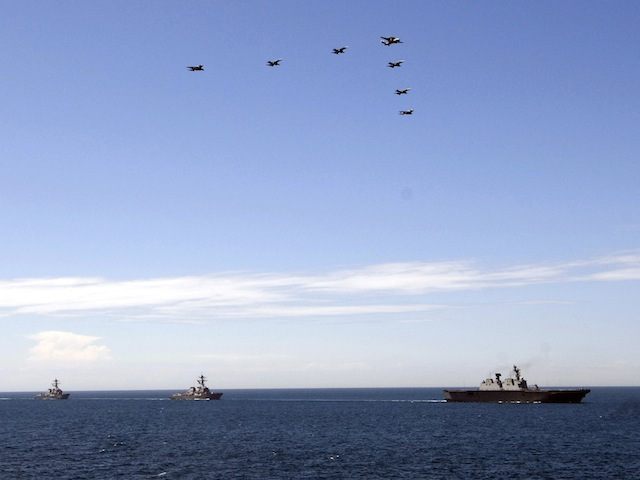After months of procrastinating, the Obama administration finally authorized the U.S. Navy to conduct fully sanctioned international law “freedom of navigation” operations in the South China Sea to challenge China’s illegal claims.
The reason these non-provocative operations have taken on such significance is because of China’s illegal claims to essentially annex the entire South China Sea as its territorial waters. Compounding the problem are China’s aggressive actions in building “artificial” islands over submerged reefs and rocks. Airstrips, along with other questionable installations, have been built on these “artificial” islands and they most likely are being built for military purposes.
It would not be a surprise to see China now starting to move combat aircraft and ships to its new “artificial” base at Fiery Cross Reef in the Spratly Islands. This would most likely be followed by moving military forces to new bases being built on Subic Reef and Mischief Reef – a mere 134 nautical miles from the Philippines, well within the Philippines’ 200 NM economic zone but 800 nautical miles from mainland China and the vital commercial sea lanes of the Palawan Trench.
In an op-ed that Rick Fisher and I wrote on 14 June 2015, we stated that China’s Communist Party leadership views control of the South China Sea as essential to protecting Hainan Island as a base from which it intends to project global military and space power. Furthermore, it is part and parcel of the bullying tactics embodied in China’s Anti-Access, Area-Denial (AZAD) strategy to drive the United States out of the Western Pacific. China clearly wants hegemony over the first island chain, which includes Taiwan, and eventually out to the second island chain, including Guam, which is now our key Western Pacific base.
The South China Sea is a critical maritime area for the free movement of what amounts to about one third of the world’s commercial traffic on a daily basis. This translates into over five trillion dollars in global trade on an annual basis. The South China Sea is also a critical sea lane for our allies Japan, South Korea, the Philippines and Taiwan.
Clearly, we need a new strategy for the Western Pacific that embodies an “armed peace” as described in our aforementioned column. It offers the best strategy to maintain stability in this vital sea area and send the necessary signal to China to prevent them from initiating manufactured incidents.
Let’s face reality: a single ship conducting “Freedom of Navigation” operations once in a while will clearly be insufficient to send the necessary message to China. Secretary of Defense Ashton Carter stated that the U.S. “will fly, sail or operate wherever international law allows.” Consistent with that statement, you never announce your intentions or the operations you are going to conduct in advance with a potential adversary. You always want to keep your adversary off-balance, so that you retain the initiative. Therefore, to make the Secretary’s statement a reality, major “unannounced” three-dimensional type operations will need to be conducted in the South China Sea, including exercises with the Philippines and Vietnam, as well as with Australia, Japan, Malaysia and Brunei.
Chinese officials making arrogant threats and blustering that we have threatened their sovereignty and security by making a peaceful, innocent internationally-recognized “freedom of navigation” transit, just like the Chinese Navy did recently off our Aleutian Islands, is nonsense. Further, Admiral Wu Shengli, head of China’s Navy, should understand making threats has never intimidated the U.S. Navy in over 239 years and it certainly will not be intimidated now!
The message to China must be clear. If China wants to be respected as a great power, then they have to start acting like a great power, and stop bloviating like their puppet state North Korea and adhere to recognized international norms.
James A. Lyons, U.S. Navy retired Admiral, was commander-in-chief of the U.S. Pacific Fleet and senior U.S. military representative to the United Nations.

COMMENTS
Please let us know if you're having issues with commenting.